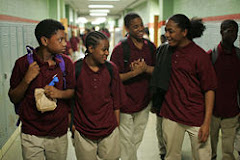I finished Oryx and Crake (Atwood) today, and am thinking pretty serious about using it.
First off, I really liked it. While it wasn't my favorite book I've ever read (it started out pretty slowly and the character of Oryx remained too much of a mystery to me), it was still riveting at times. I got to the point where I couldn't put it down. I was reading it at stoplights. I'm generally a sucker for apocalypse stories, and this didn't disappoint. It's my favorite Atwood I've read and I liked it a lot.
With The White Tiger (Adiga) and Native Son (Wright), I'm cultivating a curriculum that is centered around the battle between the classes. Native Son filters the anger through American racism, and features a character who is so beaten down by this disparity that he commits a couple of horrible crimes. The White Tiger does something similar, creating an angry narrator who eventually (spoiler coming, though he states it in the first few pages) kills his boss as a manifestation of this unfairness of the caste system.
Oryx and Crake isn't as clearly about this theme as the other two texts are. Atwood's novel is more of a warning about the dangers of science, of bioengineering run amok, of humans trying to play God. But the society she depicts is one of massive separation, of gated communities vs. the common folk. And, in her world, capitalism has run amok; we see depictions of legal child pornography, videotaped executions and suicides, commoditized gene splicing in order to improve appearance, etc. Eventually, the "haves", or at least one member of them, uses the "have-nots" (called Plebes in the book) for his own crazy experiments.
While the other two texts depict the anger coming from that other side, this one doesn't. We don't meet any of the Plebes. And Atwood's central message, as aforementioned, doesn't seem to be about the worrisome effects of this economic gap, of this caste system, but rather on the bioethical side of things.
Still, I think I can squeeze it, that the theme is running through all of the texts enough.
Other factors: Atwood is a female author and is Canadian, so that is helpful for my goals. It's looking like my course will be (1st semester) Shakespeare, Baldwin [nf], Morrison [fic], and Hughes [poetry, because we read Plath this year] and (2nd semester) Wright, Adiga, ______, ______. In other words, I have to get some women in there; even if I fill these last two novel slots with women, as I'm planning to do, there will only be 3 out of 8. (I'm not 100% sure on those 1st semester texts just yet, particularly the poetry and non-fiction; Shakespeare is required.)
Also, the novel is rather long - 374 pages. The White Tiger is 276 pages, and Native Son is 430 pages. All are pretty long. Oryx and Crake and The White Tiger are both accessible modern page turners. Native Son is for the first 300 pages, but then becomes a bit of a slog in the last 100 pages or so. These books will be read in Feb-May to seniors who will graduate the first week of June and need plenty of time to prepare for the IB assessments at the end of the year; I bet they pretty much need to be done by the start of May (need to double-check on this). In other words, I need to make sure I don't go too crazy with novel lengths. That's a factor.
(The list I have to work from is right here.)
Additionally, I'm noticing that two of the novels I'm considering are very modern (Adiga and Atwood), and that could be a factor. I love modern literature, but I want them to be prepared for something less modern as well, especially as it might appear on the IB tests. This is a factor that I must consider.
The course is a 2 year course, so some of these things could have been factored in already. Last year, we read Allende, Puig, Kundera, Shakespeare, Plath, Shelley, and Murakami. Shelley's the only 19th century author. Wonder if I should worry about getting another in there?
Just thinking out loud here. Next up is July's People (Gordimer). It's only 150 pages or so and I'm already about a quarter into it - should have it done by tomorrow. Then God of Small Things (Roy). Then, perhaps, House of Mirth.
Resep Masakan
9 years ago

6 comments:
House of Mirth! It's 20th century, but will feel older to your students, a female American author, but still thoroughly connected to your class-struggle pattern.
I think I already chimed in on your last post, but can't help myself-- I love Wharton's work so much and haven't gotten to teach it yet myself.
I know you want a female author, but I have to throw in Howard's End, by E.M. Forster. It does a great job of fleshing out the class divisions in early 20th century England, particularly the rise of the middle class and the "old guard's" reaction to it. There's also a little anarchy and great potential for discussion re: what responsibility--if any--wealthy citizens have for the poor.
And, if it helps, it does have strong female characters.
I've got no advice on books, but your post convinced me to get Oryx & Crake. I've got to finish The Wave (Walter Mosley) before I can start it, but it fits into my current craving for dark Sci-Fi reading this summer (just finished Kindred).
Learning English is very easy. Writing english is very easy. :) :)
Easy for those who really want to learn like "you".
Great blog..
Cheers
Wow great information thanks for posting............ very nice blog...........
___________________
Smarry
Online Marketing of your brand
cabal Server Private
Post a Comment